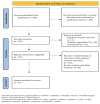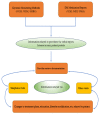The Effect of Telemedicine in Glycemic Control in Adult Patients with Diabetes during the COVID-19 Era-A Systematic Review
- PMID: 37685740
- PMCID: PMC10489036
- DOI: 10.3390/jcm12175673
The Effect of Telemedicine in Glycemic Control in Adult Patients with Diabetes during the COVID-19 Era-A Systematic Review
Abstract
Telemedicine can be an effective tool for managing chronic diseases. The disruption in traditional diabetes care resulting from the COVID-19 pandemic led to global interest in telemedicine. With this manuscript, we evaluated the use of telemedicine for the management of diabetes during the pandemic and its impact on glycemic control, focusing on retrospective and prospective studies which included adult, non-pregnant patients with diabetes. We evaluated whether there was an improvement in HbA1c, time in range (TIR), glucose management indicator (GMI), mean glucose values, hypoglycemic episodes, time below range (TBR), or hospitalizations for hypoglycemia/DKA, depending on the available information provided. This review article highlights the benefits of telemedicine during the global state of emergency, which altered the standard of healthcare delivery. Across the studies reported in this review, telemedicine was shown to be an effective tool for the management of diabetes, illustrating its potential to be the new standard of care. Although these improvements may be confounded by potential extraneous factors present during the pandemic, telemedicine was shown to positively impact glycemic control. Overall, this article highlights the benefits of telemedicine on glycemic control during the global state of emergency, which altered the standard of care. With the rollback of COVID-19 restrictions, and a return to the office, this article emphasizes the necessity to study how telemedicine can be best utilized for diabetes management when compared to the traditional standard of care.
Keywords: COVID-19; diabetes; glycemic control; pandemic; telemedicine.
Conflict of interest statement
E.K.S. was partially supported by the VA MERIT award (#1I01CX001825) from the United States (US) Department of Veterans Affairs Clinical Sciences Research and Development Service. E.K.S. has received unrestricted research support from Dexcom and Tandem Diabetes Care (to Baltimore VA Medical Center and to University of Maryland) for the conduction of clinical trials. F.S., R.H., R.M., and N.P. have nothing to disclose.
Figures


References
-
- Centers for Disease Control and Prevention By the Numbers: Diabetes in America. [(accessed on 25 October 2022)]; Available online: https://www.cdc.gov/diabetes/health-equity/diabetes-by-the-numbers.html.
-
- Saeedi P., Petersohn I., Salpea P., Malanda B., Karuranga S., Unwin N., Colagiuri S., Guariguata L., Motala A.A., Ogurtsova K., et al. Global and regional diabetes prevalence estimates for 2019 and projections for 2030 and 2045: Results from the International Diabetes Federation Diabetes Atlas, 9th edition. Diabetes Res. Clin. Pract. 2019;157:107843. doi: 10.1016/j.diabres.2019.107843. - DOI - PubMed
-
- Zhou F., Yu T., Du R., Fan G., Liu Y., Liu Z., Xiang J., Wang Y., Song B., Gu X., et al. Clinical course and risk factors for mortality of adult inpatients with COVID-19 in Wuhan, China: A retrospective cohort study. Lancet. 2020;395:1054–1062. doi: 10.1016/S0140-6736(20)30566-3. - DOI - PMC - PubMed
Publication types
Grants and funding
LinkOut - more resources
Full Text Sources

